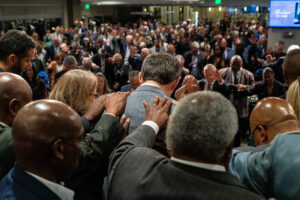
NASHVILLE, Tenn. (BP)–While Southern Baptists have long been known for their missions support, an official with LifeWay Christian Resources said they must become “missional.”
Barry Sneed, director of LifeWay’s church consulting practice, said SBC churches have to learn to conduct the same kind of outwardly-focused activities that missionaries do overseas.
“It takes consistency and being intentional,” said Sneed, who helped design and write Body Life Journey, a popular curriculum piece that helps churches incorporate new members.
Many churches fail to take a welcoming stance toward visitors or involving new members in congregational life, he said.
And although Sneed doesn’t have any statistical data on the scope of the problem, he said with more than 70 percent of Southern Baptist churches plateaued or declining the problem is obvious.
“This is one of the issues we deal with on a regular basis,” he said. “With 90 percent of the churches we deal with that I would term as a healthier, growing church, [assimilation is] one of the first or second issues that come on the table.
“Their hand is forced,” Sneed added. “They’ve got to do a better job with it.”
At a conference LifeWay conducted in a West Virginia association, they asked new members at growing congregations there why they came to those churches.
While organizers expected to hear that it was something like worship style, nearly everyone talked about a relationship with an existing member — a neighbor or co-worker — who had invited them, Sneed said.
“They came to church or made a profession of faith based on a relationship,” he said. “They stayed based on a significant relationship and finding what their role was in the church.”
Southern Baptists in other areas echo Sneed’s observations.
Darryl Wilson, director of the Kentucky Baptist Convention’s adult Sunday School and discipleship group, recalled the lukewarm reception he received once as a guest speaker.
Although a greeter showed him and his wife to Sunday School, Wilson said no one acknowledged their presence, even though he made comments during the lesson.
Not until they were leaving did a member say, “Thanks for being here.”
“If I had been a guest showing up in your Sunday School class — scared to death, like most folks are — would I come back next Sunday?” Wilson asked. “The answer is no, because I didn’t feel any relational connection.”
But he said a greeter who learned their names, introduced them and accompanied them to the service would have left a much better impression.
Longtime Paducah, Ky., area pastor Frank Queen got an inside look at several churches while he was an interim pastor the past five years before taking a position as a hospice chaplain.
While most claim to be friendly, too often that only means toward existing members, he said.
Queen, who has led state convention workshops on building relationships, pointed to First Baptist Church in Orlando, Fla., as a good example of a welcoming church; he and his wife visited it several years ago while on vacation.
By the time they reached Sunday School, half a dozen people had greeted them by name. After class, a young couple invited the Queens to sit with them in the service.
“Being friendly with new people is the key,” he said. “We have to reach out. We don’t do that. It’s not a normal thing. We have to be taught.”
Sneed of LifeWay said there are several avenues that can help congregations adopt a more welcoming posture. Among them are classes for new or prospective members and improved discipleship so new members understand their gifts and place in the church.
Another is strengthening small groups, whether that is through Sunday School or other types of fellowships.
“You may have somebody come do the ‘look and see’ if there’s something special about worship,” Sneed said. “But they won’t stay unless they connect. No matter how good or bad it is, they’re not going to find their place in the worship service. It’s all about connecting.”
Wilson thinks churches should shrink Sunday School class sizes. He said a class of 10 members offers a manageable number of two-way relationships, but at 20 there are too many for everyone to know each other.
“New classes tend to engage new people,” Wilson said. “Most existing classes tend to maintain current relationships.”
As for congregations that mistakenly think they’re friendly, Wilson said people develop a blind spot as they interact with familiar faces.
Because they are typically friendly with members and pat one another on the back, many fail to grasp their failure to project the same warmth to visitors and newcomers, he said.
“Trust is definitely an issue,” Wilson said of building relationships. “We don’t know them, don’t trust them and they don’t trust us. A [good] greeting process helps build that trust.”
Considering the large number of congregations that need to improve their assimilation procedures, though, the question is: Why don’t more do it?
“I ask myself that every day,” Sneed said. “I think churches and church practices are in such flux … that pastors and church staffs miss the target. They’re looking for the next silver bullet.”
Church leaders are to help people discover their spiritual gifts and purposes, encourage them to serve and establish accountability to keep the process moving, Sneed said.
What LifeWay’s research has shown is that many churches are good at strategy development but not very good at implementation, Sneed said.
“You can have good intentions but how will you make it happen? Have you built in accountability to make that happen?” he said. “Some do it well. Others don’t.”
–30–















